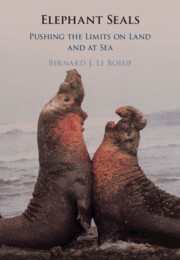Book contents
- Elephant Seals
- Elephant Seals
- Copyright page
- Contents
- Preface
- Acknowledgments
- 1 Origins, Misnomers, and Bottleneck
- 2 Back from the Abyss, Population Recovery, and Genetic Aftermath
- 3 The Year of the Seal
- 4 Fieldwork 101
- 5 Adapting to Life at Sea and on Land
- 6 The Cost of Living in a Seal Harem
- 7 Coito Ergo Sum
- 8 Females
- 9 Diving, Foraging, and Migration
- 10 Development
- 11 Sleep When You Can
- 12 What Is All the Noise About?
- 13 Comparisons, Unsolved Mysteries, and Conclusions
- References
- Index
- Plate Section (PDF Only)
3 - The Year of the Seal
Published online by Cambridge University Press: 23 September 2021
- Elephant Seals
- Elephant Seals
- Copyright page
- Contents
- Preface
- Acknowledgments
- 1 Origins, Misnomers, and Bottleneck
- 2 Back from the Abyss, Population Recovery, and Genetic Aftermath
- 3 The Year of the Seal
- 4 Fieldwork 101
- 5 Adapting to Life at Sea and on Land
- 6 The Cost of Living in a Seal Harem
- 7 Coito Ergo Sum
- 8 Females
- 9 Diving, Foraging, and Migration
- 10 Development
- 11 Sleep When You Can
- 12 What Is All the Noise About?
- 13 Comparisons, Unsolved Mysteries, and Conclusions
- References
- Index
- Plate Section (PDF Only)
Summary
Elephant seals gather in large groups on land throughout the year. In the nineteenth century and before, humans were keen to exploit large animal and bird aggregations for food or profit and this decimated many animal populations. In recent times, the focus has shifted from harvesting wildlife to viewing animal aggregations for pleasure, entertainment, or knowledge. The cultural and economic benefits of wildlife watching are immense, and such activities have increased exponentially in the last few decades. The downside is that too much tourism disturbs the animals being viewed, affecting foraging and reproduction. Elephant seals are robust against disturbance and can be observed from 10 m without disturbing them. Viewing sites are Año Nuevo State Park and Piedras Blancas in California and Península Valdes in Argentina. Seal activities are divided into four quadrants that describe the annual cycle: breeding season, female and juvenile molt, male molt, and juvenile haul-out.
Keywords
- Type
- Chapter
- Information
- Elephant SealsPushing the Limits on Land and at Sea, pp. 17 - 27Publisher: Cambridge University PressPrint publication year: 2021

